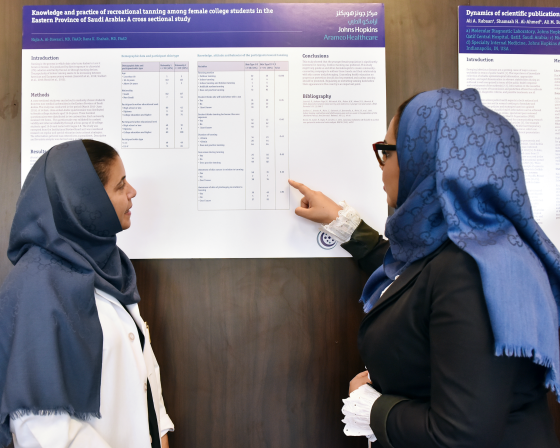Why do medical researchers report their findings? One primary reason is it promotes an exchange for ideas. When you read a research article or listen to a research presentation, you typically learn something new about disease diagnosis or management. And it’s a two-way street: Investigators often also learn something from the audience’s comments, which can lead them to refine their research project.
Research forums usually occur at national and international conferences and congresses. However, many academic centers also hold research days where investigators can present their findings. These intra-institutional research symposia recognize researchers and their accomplishments, and they encourage cross-pollination among investigators. These interactions may even lead to novel approaches because multidisciplinary teams can organically grow out of a conversation sparked at the research day.
These were some of the initial drivers that led to the inaugural Johns Hopkins Aramco Healthcare (JHAH) Research Day, held in December 2017. From the very beginning of the joint venture, both partners prioritized enhancing JHAH’s research program.
In a previous post, I described how Dr. Pete Miller from the Johns Hopkins Institute for Clinical and Translational Research led a team that developed a fundamentals of clinical research course for JHAH investigators that they delivered in Dhahran over several days in December 2016. As one component of that course, participants identified research questions that they developed and refined into research studies and then presented at JHAH’s research day.
In addition to the projects that grew out of this research course, JHAH’s research day attracted investigators from many disciplines, including medicine, nursing and allied health. In any organization, compartmentalized information can hamper progress. So, we saw this event as a great way to foster multidisciplinary, collaborative research efforts.
Another unique aspect of JHAH’s research day was that it incorporated research projects from medical residents and students, and it included representatives from other important medical institutions in Saudi Arabia such as King Abdulaziz City for Science and Technology and King Abdullah University of Science and Technology.
As JHAH continues to grow more prominent within the Kingdom’s health care landscape, research efforts are going to be a way for the health system to tell its story of success. The inaugural research day is the first chapter of this story, and it’s going to be exciting to see how JHAH’s research program continues to build on these early accomplishments.
